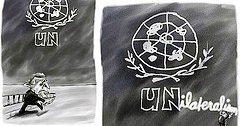The attack occurred on roughly the same date as the fourth anniversary of the fall of Baghdad. The insurgency’s message was clear: it can infiltrate and strike anywhere. The American ’Goliath’ intent on blowing the wind of democracy across the entire Middle East from Afghanistan to Iraq is still being harried by this reckless and impudent ’David’ who should by now have been exterminated but instead is becoming bolder and bolder.
Messy Middle-East
The lesson we can draw from this sensational attack is that the US cannot win this asymmetric war. In fact, the US Congress itself has voiced the general feeling that the occupying troops should withdraw from Iraq next year when George W. Bush leaves the White House. The attack on the Iraqi Parliament is reminiscent of a famous precedent: the occupation of the US embassy at Saigon on 31 January, 1968, when the US ambassador fled the country by helicopter, carrying the Stars and Stripes rolled under his arm. At that time too, President Johnson – like President Bush today – often proclaimed that the victory was at hand.
There is however a profound difference between the epoch of the Cold War and the current situation. The power vacuum left by the American withdrawal from Viet Nam was filled by the expanding influence of the Communist bloc. Today, withdrawal from Iraq would seem to open the way towards chaos, leaving a Middle East on fire and at the mercy of terrorism, organized crime, Islamic fundamentalism and nuclear proliferation. Instead of bringing a new democratic order to the region, the US has generated greater instability. The collapse of the Afghan and the Iraqi regimes under US military strikes has opened the way to state disintegration; and when states fail or collapse, non-state actors such as terrorist groups, warlords, drug and arms traffickers move in to occupy their territory.
To avoid the withdrawal from Iraq being seen as a defeat, it must take place against a less turbulent regional background. One major obstacle is the deadlock in the Israeli-Palestinian peace process, now facing a new crisis. On the one hand, there is the Israeli government – discredited in the eyes of the public by its unsuccessful attack on Lebanon, unmoving on the issue of the settlers, and aggressive towards the Palestinians; on the other hand, Palestine’s progressive slide towards the ravine of a civil war. All this removes the prospect of peace negotiations leading to an overall political settlement.
Moreover, the Iranian nuclear program and President Ahmadinejad’s threatening declaration that the state of Israel should be wiped off the world map make the situation in the region highly dangerous. At the same time, the Afghan insurgency is becoming more and more active.
Tensions with Russia
But the US government is responsible for yet another source of international tension which could worsen the West’s relationship with Russia and generate the possibility of a new Cold War. Its recent decision to site American anti-missile shield facilities in the Czech Republic and Poland is seen as the latest move in a US strategy of encirclement, which includes plans to bring Ukraine and Georgia into NATO, to grant independence to Kosovo (the Ahtisaari Plan), separating it from Serbia, to seek military bases in Central Asia and to bypass Russia and Iran by laying oil and natural gas pipelines through countries over which it could exert substantial political influence.
Russia’s reply has been the refusal to withdraw its troops from the Caucasian region, particularly from Georgia and Moldova, the rejection of the Ahtisaari Plan, and the suspension of the conventional arms reduction treaty in Europe, thereby reviving the ghost of a new arms race.
Had the US offered to suspend the extension of NATO eastward, Russia could well have responded by adopting a much more cooperative attitude in relation to stopping Iran’s nuclear program.
Going still further into this question, we should recognize that today there are dangers equally threatening both the US and Russia and which did not exist at the time of the Cold War, for instance international terrorism, and global challenges such as climate change or nuclear proliferation. No state can face these alone.
Conclusion
The world is evolving irresistibly towards a multi-polar distribution of power. The decline of American power is matched by the rise of new powers: large states such as China and India, unions of states such as the EU, and non-state actors such as global civil society movements on the one hand, and terrorist and criminal groups on the other. The power vacuum left by the US in the Middle East could be occupied by the EU, provided that it endows itself with the means to speak with one voice. The EU peacekeeping mission to Lebanon, though, insufficient, is a first step in the right direction. Only Europe can offer this essential contribution to the construction of peace, since American soldiers are not trained in peacekeeping.
No single strategy offers the prospect of victory against any of the global challenges. There is no military solution to those problems. More specifically, the ordinary tools of war are wholly ineffective as regards the fight against terrorism. It is a fundamental error to conceive power exclusively in military terms. An increasing number of global challenges need joint action. A new world order requires multilateral institutions and co-operative policies within these institutions.


1. On 25 January 2008 at 05:32, by James Rogers Replying to: The End of Unilateralist Illusion
Replying to: The End of Unilateralist Illusion
While this article raises some useful points, it also falls into a common trap; that is, it assumes that every country or power sees the world similarly, and that we can all just cooperate. This is a fallacy. Different countries often have very different interests, and while they can agree that certain problems are common to all, they often see the means to addressing those problems rather differently. This will never change, and leads not only to competition and struggle, but also conflict.
The author correctly suggests that the world will become increasingly multipolar as the current century develops. But this is no cause for celebration. Even the most cursory glance at history would remind us that unipolarity is often accompanied by a relative peace, whether it be the age of Pax Britannica in the Victorian era or Pax Americana during the late 1940s and through to the 1970s. It is when the unipolar system collapses that disorder sets in and war breaks out. The era 1914-1945 can only be evidence of that.
And finally, the idea that Russia’s current behaviour is due to American activities during the 1990s is pure nonsense. Russia has recovered somewhat from its post-Soviet malaise and is trying to reassert itself in the European Union’s neighbourhood and elsewhere. This is what growing powers do. They do not necessarily cooperate, especially when their interests are very opposed to their neighbours’ interests (as they are in so many case with Europe). This is why we in the European Union need to be willing and ready to adopt a far more assertive and hard-nosed approach to foreign affairs. In the world system a sound foreign policy is simple: rule or be ruled.
Follow the comments: |
|
